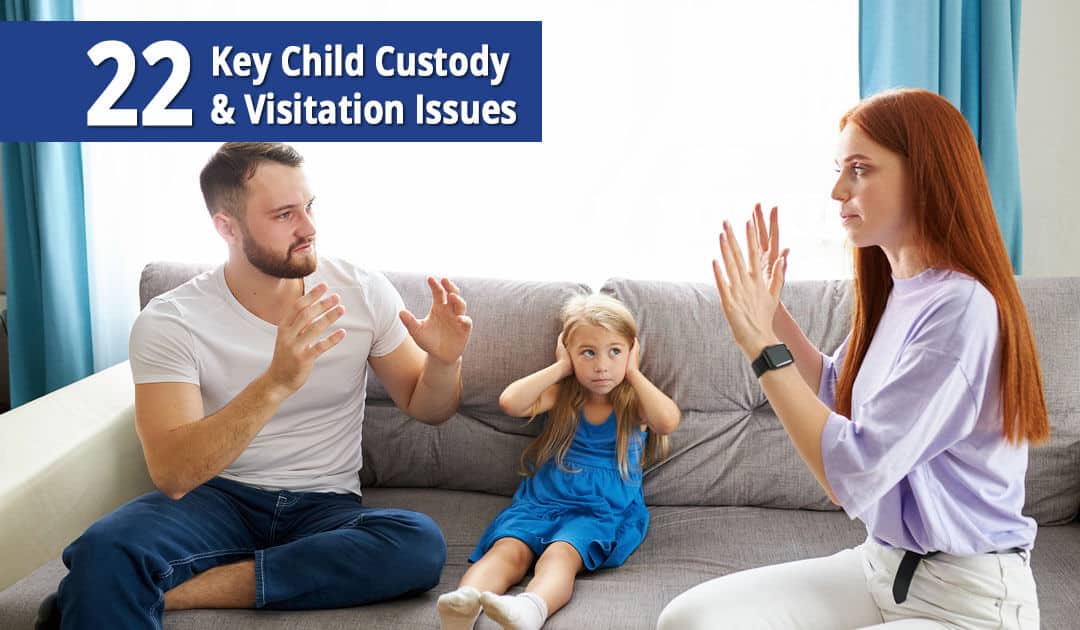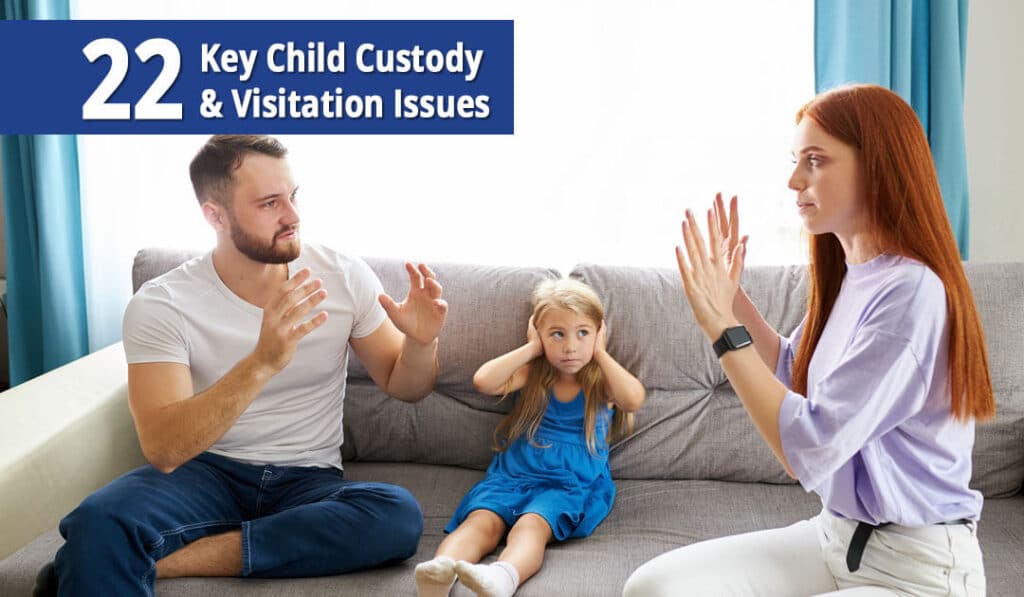22 Key Child Custody Issues to Prepare For in Divorce

Child custody and visitation are some of the most emotionally-wrought, sensitive issues when dissolving a marriage. Both parents want to ensure that remain an important part of their child or children’s lives and have a say in how their child is raised. Typically, one spouse will have primary physical custody and this leaves the other parent concerned that they will be less a part of their child’s live than when they were married and all living together.
It’s important that you are as ready as you can be to address all of the issues that may come up when dealing with child custody and visitation in your divorce. Here are 22 child custody issues you and your soon-to-be-ex-spouse should be prepared for during your upcoming Long Island divorce.
Decision Making & Communication for Your Children
- Differences in legal and physical custody. One parent may have both physical and legal custody while the other has only legal custody. Or, they may equally share both types of custody.
- Differing opinions on how to address medical treatment and emergencies for your child. The spouse with legal custody has the right to decide on how to address medial treatment for the child. If both you and your ex-spouse have legal custody of your child, you can both make medical decisions for the child. It’s important to be on the same page in this regard.
- Different visions for your child’s education. It’s not uncommon for two parents who are divorcing to have different ideas about what they want regarding their child’s education. The parent with legal custody gets to make that decision and if both parents have legal custody, they must reach an agreement or a judge will decide for them.
- Difficulty navigating external childcare. It may be challenging to navigate external childcare if your child is being picked up and dropped off at different locations by different people.
- Difficulty navigating extracurricular activities. The above also applies to older children who may be involved in extracurricular activities.
- Differences in opinions regarding discipline. It’s common for two ex-spouses to have vastly different ideas on how their children should be disciplined; often one parent ends up being stricter than the other and gets a “bad rap.” This can be confusing for the child and can result in them playing on parent against the other. It’s best if both parents can get “on the same page” and maintain the same disciplinary rules.
- Different religious beliefs between families. If you and your ex-spouse have differing religions, it may be difficult to determine which religion you will raise your child in, or if you will toe the line and raise them with respect for both.
- Disagreements about travel plans. After divorcing, one parent may not take a child out of state without the explicit permission of the other parent; doing so may be considered parental kidnapping.
- Difficulty communicating with the other parent. It’s very common for two ex-spouses to have difficulty communicating with each other after a divorce, even about things they have in common, such as the best interests of their child. Co-parenting apps can be a big help with this.
Time with the Children
- Your child’s physical custody plan. What days and times will your child spend with each parent and what does this look like on a weekly and monthly basis?
- How holidays and other special days will be treated. Who will get custody of the child on holidays or other special occasions? Will you and your ex-spouse alternate years?
- How vacations will be handled. Who gets to take the child on vacation? How long and where to?
- What extended family visitation may look like. You or your ex-spouse may want to have more control over which extended family members your child is allowed to spend time with, especially if any type of child or domestic abuse is involved.
- How telephone contact will be facilitated. Will the child be allowed to call the other parent when they are staying with the custodial parent? Will they have privacy to speak with their parent?
- How each parent is expected to behave. You should also be prepared to go into detail about how each parent is expected to behave. You may think some things are common knowledge or simply make sense, but your ex-spouse may try to push boundaries, especially if there aren’t any predefined boundaries set up.
Child Support and Expenses
- The method, time, and amount of each child support payment. These are non-negotiable without a court modification.
- Any special expenses that must be included, e.g. if a child has special needs. Special needs expenses should be added both for current and future needs.
- Health insurance costs. One parent may be required to carry the child on their private or employer’s health insurance if it provides the best coverage.
- How out-of-pocket medical costs will be paid. Be prepared to determine between you and your ex-spouse how you will pay for out-of-pocket medical costs like glasses or elective procedures. Will you split them or will the higher earning spouse contribute more?
- Who will be named as insurance beneficiaries. You may encounter some challenges determining who is named as beneficiary in your ex’s life insurance policy to ensure your child gets the money when they are legally able to without your interference.
- If the family qualifies for tax exemptions and which parent will claim them. You may disagree with your ex-spouse as to which parent gets to claim the child as a dependent on their taxes. Many parents alternate years.
- Expenses for college or vocational training. You’ll want to determine who will pay for additional education beyond high school, like college or vocational school. This should be included in your written child custody agreement.
Dealing With Child Custody Issues? Talk to an Experienced New York Divorce Lawyer Today
At Hornberger Verbitsky, P.C., we understand the unique challenges presented by Long Island divorce and child custody cases. Contact us for a consultation to discuss your case today by calling 631-923-1910 or fill in the short form on this page.
SCHEDULE YOUR FREE CONSULTATION TODAY
Call 631-923-1910 or fill in the form below
Schedule your complimentary consultation and case evaluation with our experienced attorneys today. When you call, you’ll speak to our friendly Client Services Director, who will be able to answer your general questions and set up your appointment with an attorney who specializes in your unique case.
At your meeting, your attorney will describe the many options available and determine together which is the right solution for you. By the end of this meeting we’ll all understand how we can best help you to move forward.
No Cost or Obligation
There is no cost or obligation for this initial consultation. It is simply an opportunity for us to get to know each other, answer your questions and learn if Hornberger Verbitsky, P.C. is right the right law firm for you. Give us a call at 631-923-1910 or fill in the short form below to schedule your free consultation and case evaluation.
All Fields Are Required
